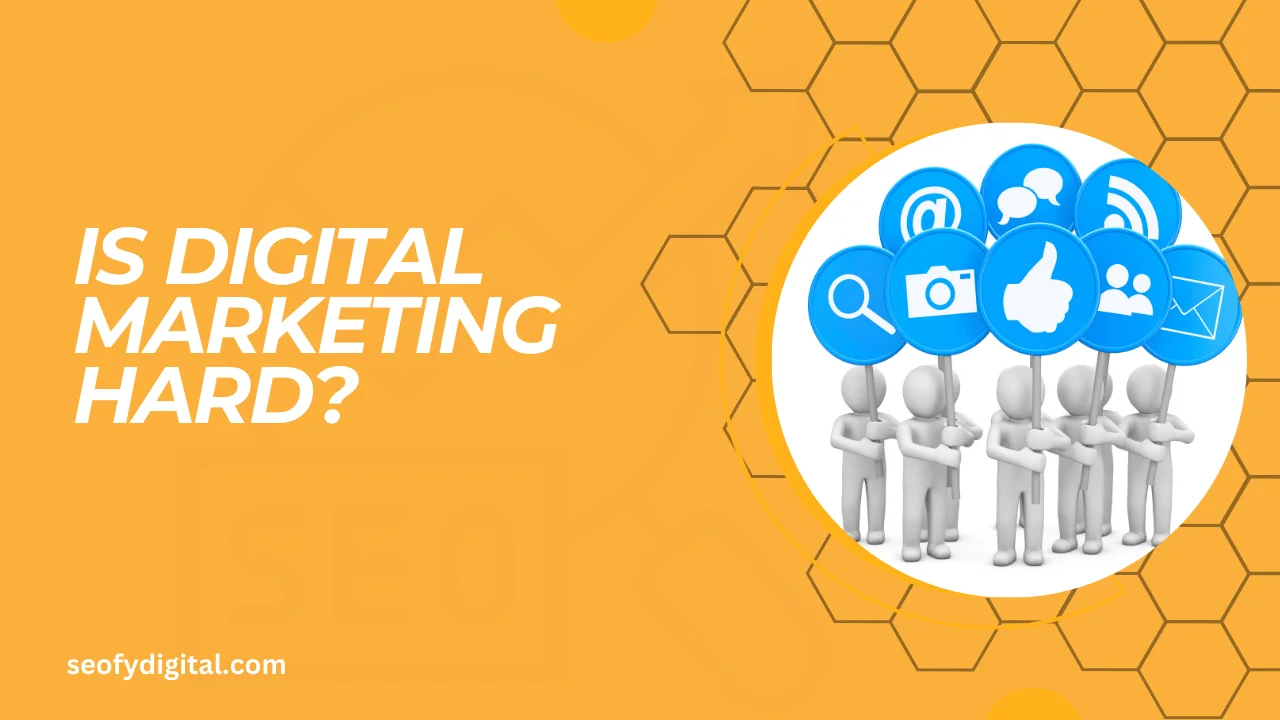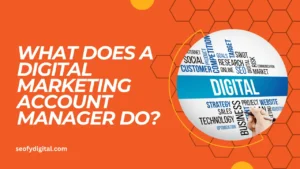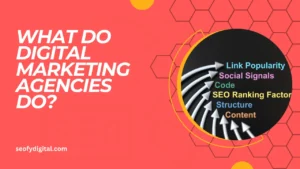Imagine building a beautiful storefront, packed with amazing products, but nobody walks through the door.
Sounds frustrating, right? In today’s digital age, that’s the harsh reality for businesses without a strong digital marketing presence.
It’s the key that unlocks the virtual door, leading potential customers right to your doorstep (or website, in this case!). But here’s the question that keeps many entrepreneurs up at night: Is digital marketing hard?
The answer, like most things in life, isn’t so black and white. Yes, digital marketing can be complex, with ever-changing algorithms, technical jargon, and a seemingly endless list of tools and strategies.
But fear not! This blog post will be your compass, navigating the exciting (and sometimes daunting) world of digital marketing. We’ll explore the challenges you might face, but also delve into the rewarding results that a well-executed digital marketing strategy can bring.
Buckle up and get ready to discover if digital marketing is the friend or foe your business needs to thrive in the online world!
Contents
- 1 The Illusion of Simplicity
- 2 The Technical Hurdles
- 3 The Creative Side of Digital Marketing
- 4 The Business Acumen Required
- 5 The Personal Side of Digital Marketing
- 6 Conclusion
- 7 FAQ’s
- 7.0.1 Is digital marketing really that hard to learn?
- 7.0.2 What are the most in-demand digital marketing skills?
- 7.0.3 How can I stay updated with the latest trends in digital marketing?
- 7.0.4 What are the common mistakes people make when learning digital marketing?
- 7.0.5 How can I measure the success of my digital marketing efforts?
- 7.0.6 What is the role of artificial intelligence in digital marketing?
The Illusion of Simplicity
While digital marketing may seem simple at first glance, it’s a complex field that requires a deep understanding of various technical skills and strategies. Many people underestimate the technical aspects of digital marketing, such as SEO, PPC, and social media analytics.
Furthermore, the digital landscape is constantly evolving, with new trends, technologies, and algorithms emerging regularly. This means that digital marketers must be adaptable and continuously learning to stay ahead of the curve.
The Technical Hurdles

SEO involves optimizing your website to rank higher in search engine results. This requires a deep understanding of keywords, backlinks, and technical SEO.
PPC requires strategic bidding, ad copywriting, and landing page optimization to maximize ROI.
Social media marketing involves creating engaging content, building a strong community, and understanding the ever-changing algorithms of different platforms.
Email marketing requires effective list building, segmentation, and automation to nurture leads and drive sales.
Finally, analytics is crucial for tracking the performance of your digital marketing efforts and making data-driven decisions.
The Creative Side of Digital Marketing
While technical skills are essential, digital marketing also requires a creative mindset. Content creation is a vital aspect of digital marketing, and it involves producing high-quality content that resonates with your target audience.
Brand storytelling is another creative aspect of digital marketing. By crafting compelling brand narratives, you can build emotional connections with your audience and increase brand loyalty.
Visual design plays a crucial role in creating visually appealing marketing materials, such as social media graphics, website designs, and email templates.
The Business Acumen Required
In addition to technical and creative skills, digital marketers need strong business acumen. This includes understanding financial metrics, managing budgets, and measuring ROI.
Client acquisition and retention are also important skills for freelance digital marketers. Building strong client relationships and delivering exceptional results is key to long-term success.
A strong understanding of business strategy is essential for aligning digital marketing efforts with overall business goals.
The Personal Side of Digital Marketing
Being a successful digital marketer requires strong time management skills to balance multiple projects and deadlines. Stress management is also crucial, as the fast-paced nature of the industry can be demanding.
Continuous learning is essential to stay updated with the latest trends and technologies. This involves attending webinars, reading industry blogs, and taking online courses.
Conclusion
While digital marketing offers exciting opportunities, it’s important to recognize the challenges and complexities involved.
By understanding the technical, creative, and business aspects of digital marketing, you can position yourself for success in this dynamic field. Remember, success in digital marketing requires a combination of hard work, dedication, and a willingness to adapt to change.
FAQ’s
Is digital marketing really that hard to learn?
While digital marketing can be complex, it’s definitely learnable. With dedication and consistent practice, you can master the fundamentals and even specialize in specific areas.
What are the most in-demand digital marketing skills?
Some of the most sought-after skills include SEO, PPC, social media marketing, content marketing, email marketing, and data analytics.
How can I stay updated with the latest trends in digital marketing?
Stay updated by following industry blogs, attending webinars and conferences, and networking with other digital marketers.
What are the common mistakes people make when learning digital marketing?
Common mistakes include focusing too much on theory and not enough on practical application, neglecting to build a strong foundation, and giving up too easily.
How can I measure the success of my digital marketing efforts?
Track key performance indicators (KPIs) such as website traffic, social media engagement, email open rates, and conversion rates. Use analytics tools to gain insights into your marketing performance.
What is the role of artificial intelligence in digital marketing?
AI can be used for various tasks, such as automating repetitive tasks, analyzing customer data, and personalizing marketing messages.








